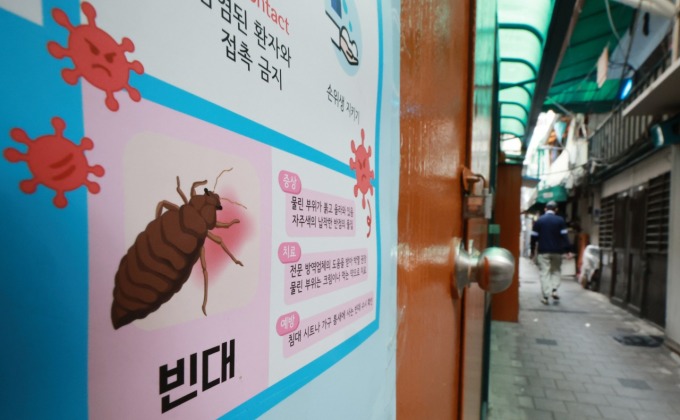South Korea has launched a four-week campaign to check for and combat bed bugs, as the blood-sucking insects continue to appear across the country.
The government will inspect high-risk facilities such as bathrooms, dormitories, and public transportation from November 13 to December 8. For facilities where bed bugs have been detected, officials plan to immediately disinfect them and hold weekly meetings to evaluate and update measures to prevent the spread of these blood-sucking insects.
Amid concerns that domestically licensed pesticides are not strong enough, the South Korean government said it will promote imports of more effective products and study the spread of bedbugs.
A team at Seoul National University published a report in April showing that bedbugs have developed a strong immunity to pyrethroid insecticides. They can even survive being dropped into a jar containing the insecticide.

Guidelines for dealing with diseases and bedbugs are posted in an alley in Seoul, South Korea, on November 5. Photo: Yonhap
The move comes amid an increasing number of bed bugs appearing in lodging facilities, public baths and other areas in South Korea, raising concerns about their impact on people's health.
South Korean officials believe that increased travel abroad following the Covid-19 pandemic may have contributed to the outbreak of bed bugs in the country. The Korea Centers for Disease Control and Prevention (KCDC) has provided insect prevention information to people from countries with bed bug outbreaks, such as France and the UK, and to companies importing goods from those countries.
South Korea has reported 30 confirmed or suspected bedbug cases nationwide as of Nov. 7, according to government data. The Bedbug Response Coordination Center, set up by the Ministry of the Interior on Nov. 3, said 17 provinces and cities had reported bedbugs as of Nov. 6.
The outbreak is worrying because South Korean health officials have recorded only nine cases of bed bugs in the nearly decade since 2014. A South Korean government official has warned that the number of cases is likely to increase. Some establishments are reportedly reluctant to notify authorities for fear of losing customers.
Bed bugs do not transmit infectious diseases, but they do feed on human blood, usually at night, causing discomfort and skin diseases. Bed bugs often live in furniture, clothing, and bedding. They spread quickly because each female can lay up to seven eggs per day.
Nhu Tam (According to Yonhap, JoongAng Daily )
Source link


![[Photo] Anh Hoang - Dinh Duc successfully defended the men's doubles championship of the National Table Tennis Championship of Nhan Dan Newspaper](https://vphoto.vietnam.vn/thumb/1200x675/vietnam/resource/IMAGE/2025/5/23/d6ab3bcac02c49928b38c729d795cac6)




![[Photo] Top players gather at the 2025 Nhan Dan Newspaper National Table Tennis Championship](https://vphoto.vietnam.vn/thumb/1200x675/vietnam/resource/IMAGE/2025/5/23/9ad5f6f4faf146b08335e5c446edb107)























































































Comment (0)